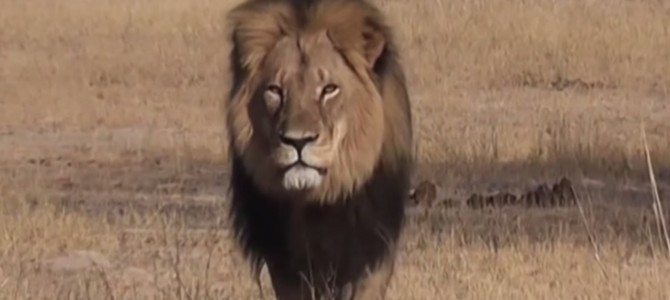
This past week the world was outraged by the killing of a male lion named Cecil who was part of a protected wildlife reserve in Zimbabwe. The Minnesota dentist who paid for the hunt has been facing a massive public backlash. This same week, the Center for Medical Progress released another undercover video, showing a doctor examining an aborted child and declaring it was a boy. Somehow, in a strange cosmic sense, the two seem related.
What did we value about Cecil the lion? What offense birthed the outrage and disgust that many people felt and voiced? What about the outrage and disgust over the Planned Parenthood video?
Professor Robert P. George dealt briefly with this confluence of the natural world and human birth in his book, “Conscience and Its Enemies.” In a short aside, George examined the argument some pro-abortion thinkers have made that we, as a people, do not mourn the loss of an acorn when it is eaten by a squirrel the same way that we would mourn the loss of an aged oak tree.
Like a fetus, the acorn contains all the genetic building material as the oak tree, but we do not value it the same way. So why should we be so incensed that a small human—at times the size of an acorn—is similarly destroyed? George responds: “But while it is true that we do not feel the same sense of loss at the destruction of an acorn, it is also true that we do not feel the same sense of loss at the destruction of an oak sapling. Clearly the oak tree does not differ in kind from the oak sapling. This shows that we value oak trees not because of the kind of entity they are but rather because of their magnificence.”
The Majesty of Cecil the Lion and Innocence of a Child
Cecil the lion was, if anything, a magnificent creature. Social media is adorned with pictures of the great cat that inspire awe, respect, and a glimpse at the cosmic wholeness of life. So many mourned Cecil’s death as the death of a natural magnificence.
But there is more to it. It is not just that Cecil the lion was a fine specimen, but much of what people value and mourn in the loss of animals is their innocence. They are not morally culpable. They exist on a simpler plane of consciousness in which there is no right or wrong, but just nature and instinct. Cecil was both magnificent and innocent, and the world has rightly mourned his loss and oftentimes mourns the loss of other creatures of great magnificence.
George extends the acorn analogy to include saplings. We generally do not shudder at the loss of an oak sapling the same way we would at that of an ancient oak. However, we collectively recoil and are outraged at the death of a child. This week, as well, the world was horrified to learn of a Palestinian child burnt to death in an act of arson, and his death is being held up as measure of man’s brutality to each other. Why are we outraged by the death of the child, but not the sapling? Why are the videos of Planned Parenthood so nauseating?
A Child’s Innocence Is Its Majesty
It is because humanity, unlike the natural world of lions, is both blessed and cursed with a conscience and moral culpability. Because of that moral culpability we are left with the stain of original sin. We are, by our mere existence, guilty. Who among us can claim innocence of egregious sin? Not sin in the Biblical sense, but rather more broadly—who among us has not caused some degree of harm and pain? Who has not been ugly and debased? Who has not had thoughts that would terrify and condemn?
We, as a species, are not all that likeable and certainly not, in any sense, magnificent. Instead, each one of us is a lowly creature. Even the intellectual giants that humanity has produced and enshrined have been merely human, with as many debauched desires, weaknesses, and faults as any man or woman of the street. We grovel and beg, we kill and steal, we laugh at horrors and use each other for personal gain. Man attends to religion to try to save humanity from itself. None of us is innocent, and we spend our lives trying to reconcile and rationalize our guilt.
Then, there is the child. The life that is not yet morally culpable; which, interestingly enough, has been used as an excuse for why we should permit unrestricted abortion. It is the argument that the baby cannot be considered a human life because it is not morally culpable or fully conscious of its being.
It is during this period of true and pure innocence when humanity is precisely at its most magnificent. It is the only point in any life where innocence and magnificence are both contained within one tiny little acorn. For humanity, innocence and magnificence are one in the same. Many attempt to turn a blind eye from the acorn in the womb, but only because we can ignore it then. At that size, a child’s own mother may not even want it, and we hide this gruesome reality behind sterile euphemisms, whereas a walking, talking, sleeping child that is burned to death in his home cannot be so readily ignored (though surely, some may try).
Cecil the lion had done no harm, and even if he had we would not hold him morally culpable for his actions. He remained innocent and magnificent until the day he died. Humans do not have the luxury of everlasting innocence or magnificence. Our time is a very short one indeed—and made all the more so when it is cut off at the root.









